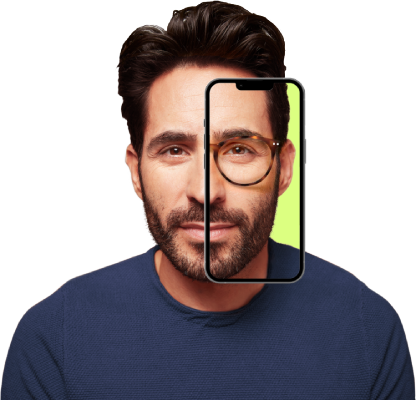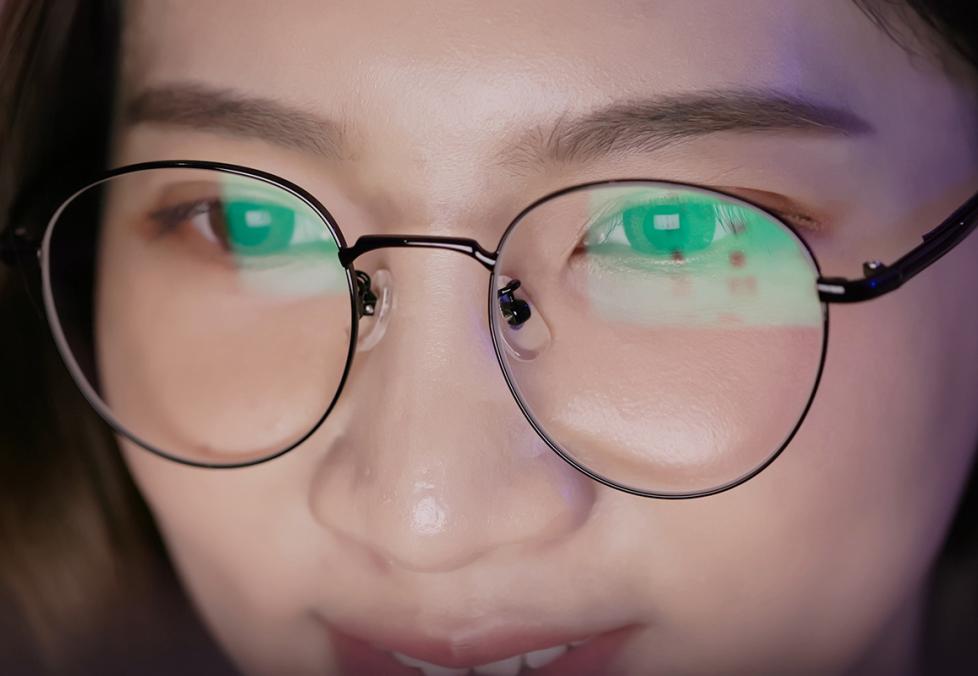
With our virtual try-on tool, finding your perfect pair is as easy as looking into your camera.
Everything you need to know to take care of your eyes — for life.
Like the name suggests, these lenses can help filter out some of the bright light that’s emitted from smartphones, tablets, and computers. Here’s how it works.

More than ever, we’re surrounded by blue light. We encounter it at work, at home, and nearly everywhere in between. So, the question is... Is blue light a bad thing?
When it comes to your sleep, it turns out, the answer is yes.
If viewed in the hours before bed, blue light — which emits the shortest wavelength and has the highest energy levels of all the other colors in the visible light spectrum — has been shown to interfere with our shut-eye, according to a review published in August 2022 in the journal Frontiers in Physiology. Not only can blue light shorten the amount of time we spend snoozing, but it can also decrease the quality of our sleep.
“Being exposed to blue light really disrupts your circadian rhythm, which is basically your body’s internal clock,” says Mike Ganaway, a lens-specialist for America’s Best Eyecare + Eyewear based in Duluth, Georgia. “It can really mess up your sleeping patterns and almost trick your brain that it’s not time to go to sleep.”
A lack of sleep can also cause problems for your eyes. The longer our eyes stay open, the more our tears will continue to evaporate from the surface of our eyes. (We also blink less often while looking at screens.) This can lead to dry eye, according to a review published in 2018 in the International Journal of Ophthalmology.
Moreover, a lack of sleep can lower the body’s levels of androgen — a type of hormone that includes testosterone — which can interfere with the glands in the eyelids, worsening dry eye symptoms.
The problem isn’t the blue light that comes from the sun (which is the largest source of blue light). The real potential trouble stems from the blue light that’s baked into the many screens we use throughout the day, including smartphones, tablets, and computers, particularly in the hours right before we fall asleep at night.
“We have a lot of exposure to blue light when we’re looking at these devices because we’re holding it very close to our eyes, so your eyes are getting that strong blue light penetration,” says Ganaway. Plus, he adds, given the amount of time we spend glued to our phones, we’re “being exposed to blue light for longer periods of time.”
The eye care specialists at America’s Best can help you find lenses that are just right for you!
Blue light-blocking lenses are eyeglass lenses that help filter out blue light. The lenses can either be coated with a type of material that blocks some of the light, or it can be added to the lens material itself (similar to how a prescription is added to UVA/UVB-blocking sunglasses).
The NeverBlue lenses from America’s Best — which can reduce blue light exposure by 20% — has blue-light blocking filters built directly into the lenses. (Standard clear lenses only block 5% of blue light.)
“The blue light-properties are put into the lens when it’s being made — almost like adding flour to a cake mixture,” says Ganaway.
Blue light-blocking lenses aren’t a different color or tint than regular lenses, he says, so no one would be able to tell you’re wearing them. They also don’t require any special care, he says.
Almost everyone is a candidate for blue light-blocking lenses. That’s because almost all of us use a smartphone, tablet, or computer at some point during our day. Most of us are also looking at our screens at night — according to a 2022 poll from the National Sleep Foundation, 58% of people use their devices within an hour of falling asleep.
Blue light-blocking lenses may be best for younger people, who may be on smartphones for longer periods of time, rather than older adults who don’t use them quite as frequently, says Ganaway.
And, considering how many children use smartphones or tablets, it also makes sense for kids to use blue light-blocking lenses once they start wearing glasses, he says. One study published in the Journal of Adolescent Health found that teenage boys who wore blue-light blocking glasses at night while using a smartphone felt sleepier before going to bed.

With our virtual try-on tool, finding your perfect pair is as easy as looking into your camera.
If you’re glued to a screen during the day — and frequently find yourself scrolling on your smartphone at night — you may be a candidate for blue light-blocking lenses.
“When a person sits down with a selling associate at an America’s Best store, the associate can tell them about blue light-blocking lenses, and what they can do,” says Ganaway.
Not all lenses are available with blue-light protection, however, so ask your associate what your options are. If you’re ordering eyeglasses online, you can add the “Blue-Light Blocking” feature to your order when prompted. The cost of NeverBlue lenses is $30, and it also includes 100% UV protection from harmful sun rays.
Contact lenses don’t offer any blue light-blocking abilities. But if you love wearing your contacts and still want blue light-blocking glasses for work, for example, there’s a trick you can use, says Ganaway. You can purchase just an eyeglass frame without prescription lenses. Then, add the blue light-blocking filters to the non-prescription lenses that come with the frames, he says. Just pop those clear, non-prescription eyeglasses on when it’s time to look at a screen, and voila, you’re protected.
Recommended reading: The America’s Best Guide to Eyestrain and Digital Eyestrain
See our sources:
Blue light and sleep disruption: Frontiers in Physiology
Lack of sleep, screen use, and dry eye connection: International Journal of Ophthalmology
Screen use at night 2022 poll: National Sleep Foundation
Sleep study on teens and blue-light lenses: Journal of Adolescent Health